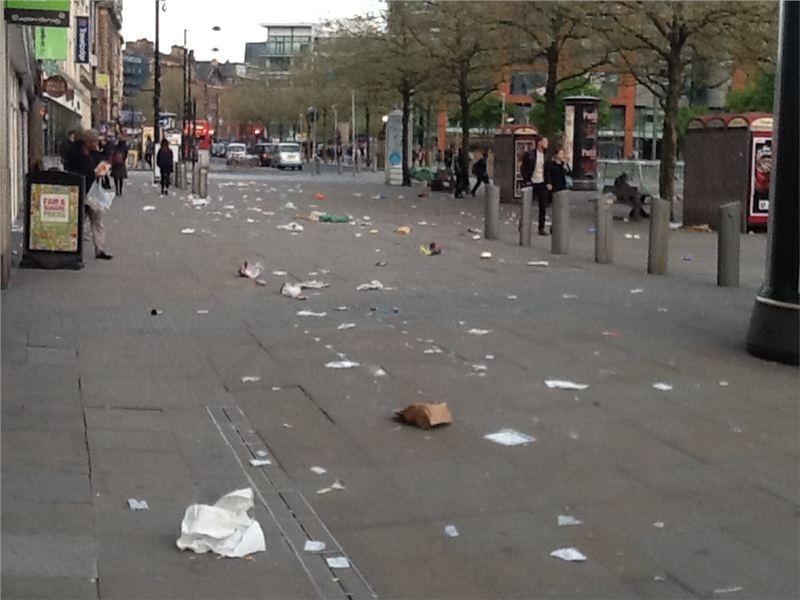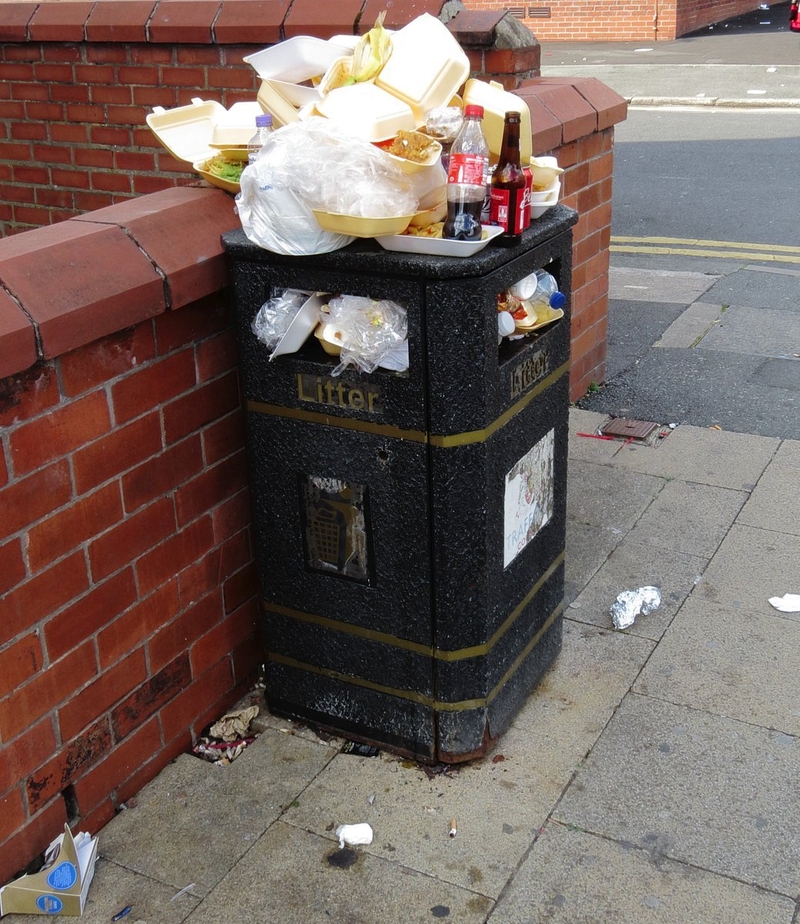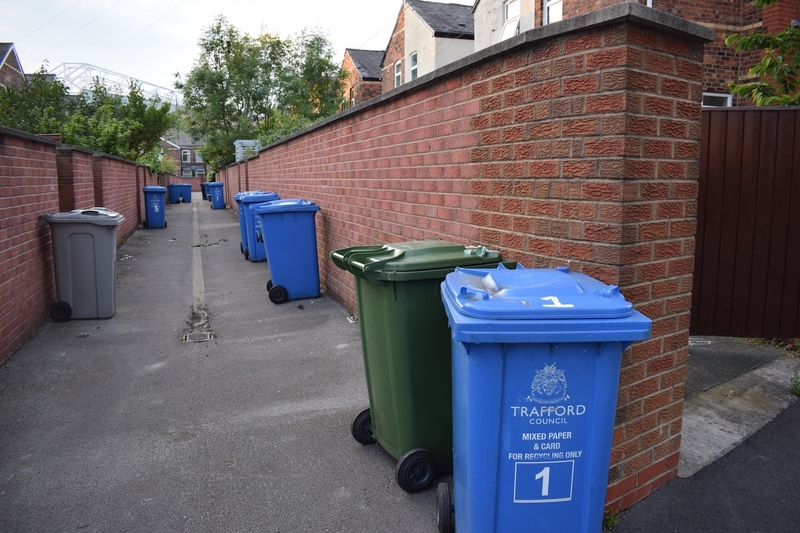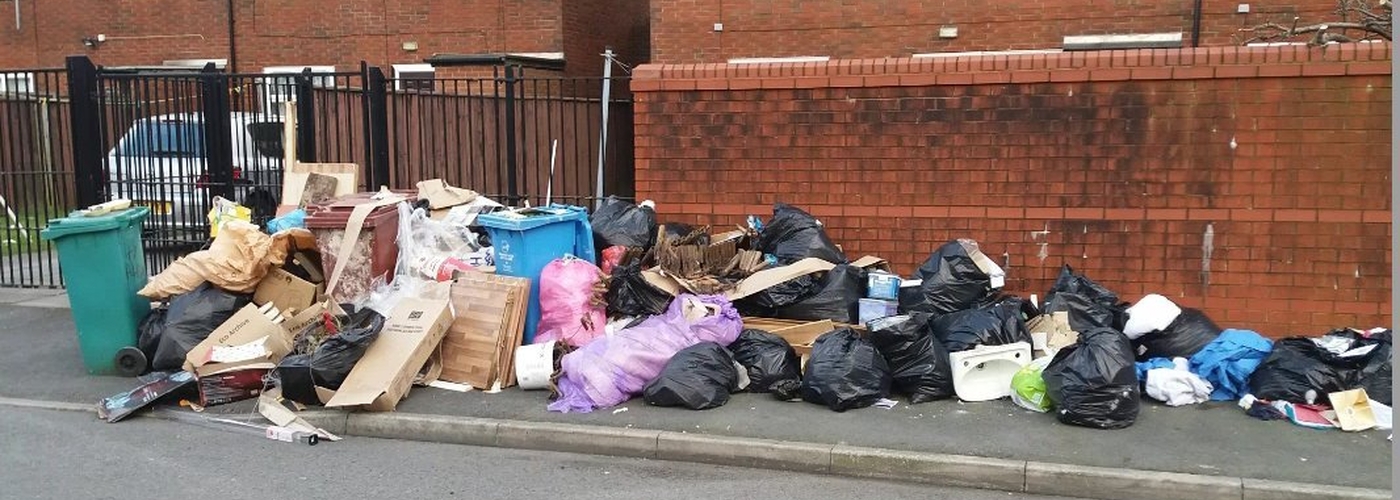Lucy Tomlinson writes another rubbish article
SPEND a few minutes on any local Facebook group and, aside from potholes, you’ll find that the most moaned-about topic is litter, dog mess and the bins. Apart from being unsightly, waste can be harmful to both people and the environment. It attracts pests, causes people to feel uncomfortable in their own communities and reflects badly on this city to visitors, whether tourists or potential investors. In short, everyone considers rubbish to be, well, rubbish. And yet, for every person I’ve seen littering, I’ve heard many more people complaining about it. So if the vast majority of us hate litterbugs, where is all this rubbish coming from?
A couple of different things have sparked my recent interest in garbage. Last week it was announced that Manchester City Council and Keep Britain Tidy have teamed up for the 'Keep Manchester Tidy' campaign that, like the Trash Talk and Clean City campaigns before them, seek to improve our environment by discouraging littering. There is an event this Thursday at Manchester Museum called 'A Rubbish Night At the Museum'; which brings together community groups, artists and professional bodies to display material designed to challenge and inspire our thinking about tackling rubbish.
The campaign was an encapsulation of the council’s monotone approach...
Simon Pardoe, organiser of the event and one of the researchers behind the Upping It Project in Moss Side, said: “The whole idea was to the bring the voices of the city into the policy room and the museum. Esme Ward, the new director of Manchester Museum, was really positive and now we have the whole top floor for our event.” The evening will be like a rubbish-themed salon, with conversation and debate, plus food from The Real Junk Food Project, which takes food that would be otherwise destined for the trash and turns it into culinary treasure.

The Upping It Project itself has been a combination of ground-level research into the causes of rubbish while simultaneously adopting community activism techniques to alleviate it. Alley greening in particular has produced some excellent results, restoring community pride and discouraging fly-tippers and general littering. I encourage anyone interested in starting a group of this sort (and any rubbish nerds like myself) to browse through the project’s website and recent report.
Pardoe’s grass roots, multi-layered approach provides a stark contrast to the various campaigns enacted by Manchester City Council over the years, starting with a one-off £14.5 million investment in sprucing up the city in 2013 and culminating in last year’s Trash Talk campaign. This led with the slogan 'Who is Responsible for Keeping Our City Clean? You Are' which, while undeniably true, had a schoolteacher’s tone which didn’t seem to be all that effective.
The campaign was an encapsulation of the council’s monotone approach to a problem with many different outcomes and causes. Back in 2013, Richard Leese said; “the big prize is changing behaviour, after all it’s not the City Council that makes the mess in the first place, it is (some) Manchester citizens.” Accordingly, more that a quarter of all staff in the Waste Disposal Authority Team have the words ‘behavioural change’ in their job title, as if lecturing people about rubbish will magically transform their conduct. While changing behaviour is no doubt important, the council’s blame game is not as helpful as it thinks it is.
This approach encourages us to think that littering is done by 'other people'
Simon Pardoe contends that this approach is misguided at best and divisive at worst. It encourages us to think that littering is done by 'other people' (recent arrivals such as migrants and students are favourite scapegoats) and that individual litter louts are the ones that need to be tackled, when in fact it is the production of unprecedented amounts of waste and inadequate means of disposing of it that is the true source of the problem. Conveniently, by focussing on littering, attention is drawn away from the issues with waste disposal management.
This sort of littering, that is the focus of both MCC and Keep Britain Tidy, is most commonly seen in the city centre. People are less conscientious in a place that they do not actually live and the consumption of alcohol also makes us less likely to hang on to our refuse until we get to a bin. As the city is full of people coming in from other areas and even drinking a pint or two, littering is going to happen.
Here, Manchester City Council’s tactics seem to latch onto at least some of the problems. ‘Enforcement’ officers give out fairly stringent fines (still £80, although the upper limit has been increased to £150) if they catch you dropping pork pie crumbs, according to a recent MEN article. Cynics may think of this as more of a money-making exercise than a true deterrent, but at least the cash is ring-fenced towards the costs of cleaning up (when contacted, Manchester City Council said they were 'considering whether to increase the Fixed Penalty Notice for littering', but that no final decision has been made. We also asked what has happened to the money raised so far and are awaiting a response).
But what is true of the city centre is not necessarily the case in other areas – the reasons suburbs struggle with litter are very different. Yes, litter louts still exist out in the ‘burbs, but they are not the main culprits. Instead the blame can be equally (if not more so) placed on fly-tippers, inadequate waste removal and waste from businesses.
I attended a residents’ association meeting in Moss Side where many of the complaints were about landlords dumping rubbish in alleys as they refitted their properties for rental (very often these landlords don’t even live in the area). Other concerns were about shops and businesses using public or residential bins, resulting in them overflowing with rubbish being blown onto the street, as well as a suggestion that the refuse collectors are not doing an adequate job of collecting the rubbish, whether through lack of time or equipment (though one lady sang the praises of her bin men – 'brilliant' was the verdict).

Manchester City Council had its budget cut by almost a third in the period 2010-2016 by central government, so it is no surprise that waste management in all its forms has been squeezed. All of the Greater Manchester-area councils have decided to focus on chasing good recycling figures as the key to lowering costs. And it is true that, as people recycle, more money is saved - plus councils are (still) committed to recycling targets issued by the EU.
You may remember that in 2016 the 140-litre grey ‘slim bins’ were introduced to encourage people to put more of their recyclables into the correct bin. Unfortunately, the slender design of these bins means they are much more prone to tipping over and spilling their contents onto the streets. Ironically, as any litter picked off the streets is not counted towards the 'waste from households' figures, the grey bins may indeed be reducing the amount of residual waste, though in unintended and unsightly ways. So according to council metrics the new bins have been a success, despite the fact that more litter is on the street than ever.
Sale Wombles withdrew from their litter picking when Trafford Council removed one of the few bins they could use
Meanwhile, an army of unpaid volunteers is providing the last line of defence against litter. Almost every district now has its own ‘Wombles’ group, while ‘Friends of’ groups and residents associations regularly organise litter picks. In general, councils are supportive of these groups (and, naturally, the free labour that they provide), making grants available and citing them in their promotional material.
Except when they aren’t very helpful – as in the case of the Sale Wombles, who withdrew from their regular litter pick in Sale Water Park when Trafford Council removed one of the very few bins the volunteers could use to put the rubbish they had collected in. Luckily the dispute has been resolved and the Wombles are back out in force, collecting a depressingly large amount of litter from the park last weekend. It is worth remembering, though, that picking up litter can be a hazardous job and that volunteers are not protected by the same rights as council-employed workers.

When I first started researching this article I didn’t know how much more rubbish I could write about (no jokes please), after covering a national deep clean: read here and here. But there is so much more.
How we dispose of our waste might not rank with Syria or data scraping in matters of the moment, but what happens to our litter is truly indicative of how we think of our surroundings. There are no easy solutions, it’s true, but I’m more impressed than ever by how various community groups try to tackle the problem with little more than some litter pickers, elbow grease and a good dash of community spirit.
Manchester City Council response to the article (19/04/18):
A Manchester City Council spokesperson said: "We have actively supported and provided funding for the Upping It project, to help them develop their work in tackling environmental issues in Moss Side. This is just one of many community projects we have helped which have aspirations to enhance their local neighbourhood.
"Our compliance teams are out in Manchester daily, taking enforcement action against landlords, businesses and individuals who commit littering and fly-tipping offences. We also have a dedicated Environmental Crimes team, which is seeing considerable success in investigating and taking fly-tippers to court.
"We reject the claim that there is 'more litter on the streets than ever before' - to the contrary, our inspections show that our waste disposal and enforcement efforts are helping to reduce levels of nuisance litter. However, we know there is more to do and that everyone in the city, from residents to the council to businesses, needs to play their part. This is the spirit in which we have launched the Keep Manchester Tidy campaign, in partnership with Keep Britain Tidy."
More on A Rubbish Night at The Museum:
Organised by Upping It in collaboration with The Manchester Museum as part of the Museum's sustainability agenda. The event draws on collaborative research at The University of Manchester, Sustainable Consumption Institute (SCI) and is funded by the SCI, plus the University's 'engaging our communities' fund.
Expect works by artists, displays from community groups, charities and professional organisations which aims to challenge and inspire universities, councils, businesses, waste authorities and residents to work together to build the intellectual and practical capacity to deal with rubbish.
The evening event is on Thursday 19 April from 6-9pm. The displays will carry on throughout the weekend, with special events for families on the Saturday. You can book your free ticket here.















